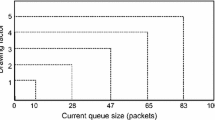Abstract
User satisfaction from a given network service or resource allocation can be viewed as having two aspects, a state and a degree. The state defines whether the user is happy or unhappy. A user is happy when its expectations are met. The degree defines the level of happiness or unhappiness. We present the use of perceived knowledge of the state and degree of user satisfaction in managing router resources and functions and examine whether such knowledge could help a router improve local resource allocation decisions. We describe our formulation, Value-Based Utility (VBU) that incorporates both aspects of user satisfaction. We establish a framework of VBU use and demonstrate its application to buffer management. We propose a FIFO scheme that uses VBU and evaluate its success in meeting user expectations. The main conclusion we draw from this work is that the VBU framework offers a different perspective of performance definition and analysis and allows for the effective distribution of resources especially in times of high demand and low resource availability. Its adoption into existing traffic management schemes is further motivated by the improved performance of our proposed scheme over its non-VBU aware counterpart.
This work is supported by research grants from University of the Philippines (UP), UP Engineering Research and Development Foundation Inc. (UPERDFI) and Diliman Computer Science Foundation (DCSF).
Preview
Unable to display preview. Download preview PDF.
Similar content being viewed by others
References
Cao, Z., Zegura, E.: Utility max-min: An application oriented bandwidth allocation scheme. In: Proceedings of IEEE INFOCOM 1999 (1999)
Cocchi, R., Shenker, S., Estrin, D., Zhang, L.: Pricing in computer networks: motivation, formulation, and example. IEEE/ACM Transactions on Networking 1(6), 614–627 (1993)
Ferrari, D.: Client requirements for real-time communication services. RFC 1193 (1990)
Ferrari, D., Verma, D.: A scheme for real-time channel establishment in wide-area networks. IEEE Journal on Selected Areas in Communications 8(3), 368–379 (1990)
Festin, C.: Utility-based buffer management and scheduling for networks. PhD. Thesis. University College London (2002)
Jamin, S., Danzig, P., Shenker, S., Zhang, L.: A measurement-based admission control algorithm for integrated service packet networks. IEEE/ACM Transactions in Networking 5(1), 56–70 (1997)
Mackie-Mason, J., Varian, H.: Pricing congestible network resources. IEEE Journal on Selected Areas in Communications 13(7), 1141–1149 (1995)
Shenker, S.: Fundamental design issues for the future internet. IEEE Journal on Selected Areas in Communications 13(7), 1176–1188 (1995)
Author information
Authors and Affiliations
Editor information
Editors and Affiliations
Rights and permissions
Copyright information
© 2005 Springer-Verlag Berlin Heidelberg
About this paper
Cite this paper
Festin, C.A.M., Sørensen, SA. (2005). Utility-Based Buffer Management for Networks. In: Lorenz, P., Dini, P. (eds) Networking - ICN 2005. ICN 2005. Lecture Notes in Computer Science, vol 3420. Springer, Berlin, Heidelberg. https://doi.org/10.1007/978-3-540-31956-6_61
Download citation
DOI: https://doi.org/10.1007/978-3-540-31956-6_61
Publisher Name: Springer, Berlin, Heidelberg
Print ISBN: 978-3-540-25339-6
Online ISBN: 978-3-540-31956-6
eBook Packages: Computer ScienceComputer Science (R0)




